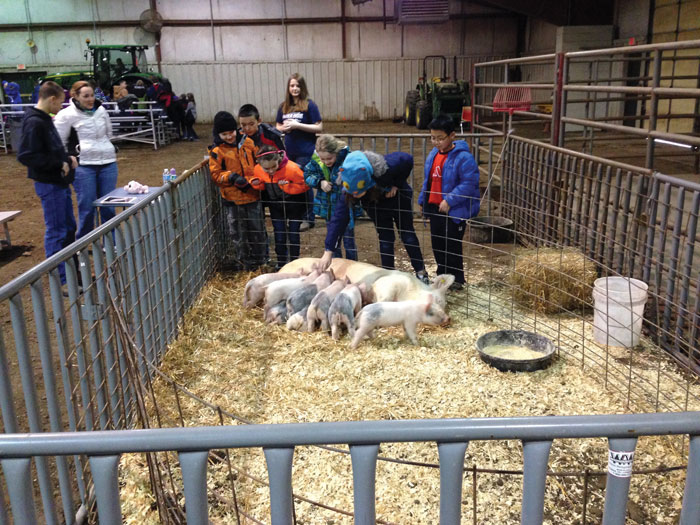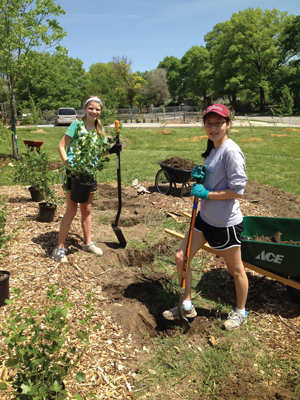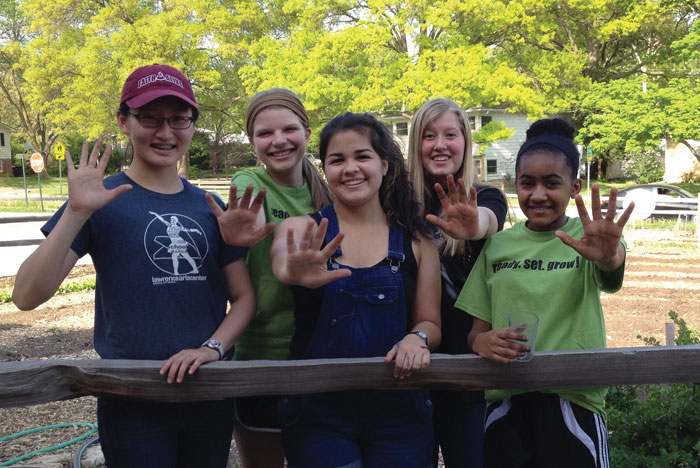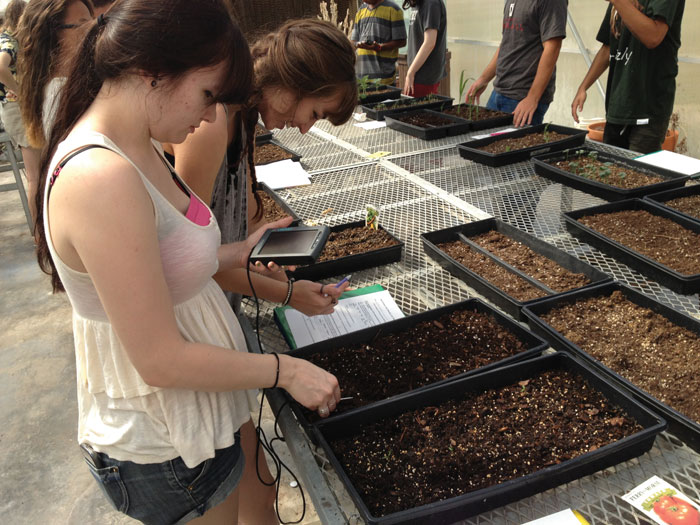GROWING UP, GROWING FOOD
| 2014 Q2 | story by MARK FAGAN | photos by LILY SIEBERT |

4-H Slice of Agriculture
Area educators are growing the next generation of farmers, consumers and others affiliated with agribusiness, right here in classrooms, on school grounds and in fields, barns and other agricultural buildings throughout Douglas County:
Nearly 1,000 fourth-graders each year are connected to world of agriculture through the foods they eat, clothes they wear and other products used and consumed each day.
Dozens of youths, ages 7 to 18, participate in 4-H clubs that foster growth in knowledge of science, healthy living and food security.
And high schoolers learn that careers in agriculture reach well beyond working in fields, extending into laboratories, business offices and practically anywhere else that people, products exist.
Students in Lawrence even find themselves eating fresh vegetables grown at their very own schools, often by classmates getting their hands dirty at the ground level of what amounts to $40 million of overall business – through crops, livestock and other agricultural products and services — in Douglas County each year.
“Agriculture is a growing industry,” says Laura Priest, who teaches ag classes at Free State High School and adviser for the school’s FFA club, commonly known as Future Farmers of America. “The opportunities are out there.”

Carly Oliver & Di Xie at West Middle School
Consuming a ‘Slice of Agriculture’
Among the most popular and comprehensive educational efforts is Slice of Agriculture, an introductory program conducted each January at the Douglas County 4-H Fairgrounds. On average, 900 fourth-graders from Lawrence, Eudora and Baldwin public schools, plus others from private and home schools in the county, travel to the fairgrounds’ community building to connect farm production to students’ everyday lives.
Each half-day visit features eight different learning stations, each emphasizing connections to items and aspects familiar to students’ in their everyday lives. Kids who may never have encountered a farm animal get a chance to see some up close, learning facts that can hit close to home:
Hamburgers, roast beef and beef in tacos all come from beef cattle. And the hide from one animal can be used to make 20 footballs, 18 volleyballs, 18 soccer balls or 12 basketballs.
Pork, which comes from hogs, is the most widely consumed meat in the world. Hogs also are used in the making of medicines, chalk and even rubber bands.
Each day a dairy cow eats 90 pounds of food, equal to more than 200 baked potatoes or nearly 1,500 slices of bread; drinks up to 50 gallons of water, enough to overflow a typical bathtub; and produces 25 quarts of milk, enough to fill about 100 glasses.
The kids enjoy pizza and ice cream, learning about the wheat and tomatoes and cheese and milk that help make it all possible. They also leave with an understanding that such products don’t just “happen.” A combine used to harvest crops, for example, can cost $300,000, well beyond what many families pay (or borrow) for a house.
“A lot of kids have never been on a farm,” says Billy Wood, who retired in May as director of K-State Research & Extension in Douglas County. “They don’t understand what it takes, working year-round – milking cows, feeding pigs, working soil – to produce the food they eat. … Somebody makes that. It doesn’t just show up in a box in a store.”
Reaping life lessons in 4-H
Slice of Agriculture is financed and presented, in part, by the 4-H Foundation and local volunteers and benefactors. But 4-H is connecting kids to agriculture both before and well beyond their fourth-grade years.
About 400 youths take part in the county’s 10 4-H clubs, including Jayhawk 4-H in Grant Township, Meadowlark in Lawrence, the Stull Busy Beavers and Clinton Eagles. Meetings and activities are conducted year-round, with leadership and other efforts covering wide variety of life skills.
Many 4-Hers showcase their agricultural products and production during the annual Douglas County 4-H Free Fair. At the livestock auction, club members’ animals are purchased by and businesses. This past year Taylor Stanley’s reserve champion rabbit sold for an $800 premium to Dr. Hershel Lewis, of Lewis Veterinary Clinic. Holly Swearingen’s reserve champion went for $700 to Conley Site Work and Utilities.
Months before the auction, club members work with family members and mentors to pick out the best young animals. Then it’s time for weeks of feeding, watering and caring for their animals – fostering and reinforcing skills, responsibility, accountability and, ultimately, results.
Talk about a business lesson: Many 4-H families use auction proceeds to bolster college savings, help finance a first car or, perhaps, even buy another animal.

Di Xie, Carly Oliver, Hope Luna, Elise Gard & Maya Hodison at West Middle School
Planting educational seeds
Such real-life experiences also are taking root at elementary and secondary schools in Lawrence.
In Lawrence public schools, dozens of students are involved in planting, cultivating and harvesting vegetables such as tomatoes, lettuce and peppers. The produce then ends up in students’ homes, school cafeterias and even local markets and stores.
Among such thriving efforts in schools is the Growing Food Growing Health initiative organized by the Community Mercantile Co-op, the store affectionately known as The Merc. The program works with three nearby schools — West Middle School, plus Hillcrest and Sunset Hill elementary schools – where a total of 14,000 square feet of school grounds are put into production.
During the program’s five years, students and their volunteer and professional helpers have raised more than 10,000 pounds – that’s right, more than 5 tons — of produce, which has ended up on lunch trays, in at local markets and in The Merc’s produce section.
The Merc buys fresh tomatoes, radishes, cucumbers, peppers, lettuce and more from the gardens, at market prices. The proceeds go back to the program. The Merc also pays five students each season — $9.25 an hour, The Merc’s minimum wage – to be student gardeners, responsible for tending to plots from April to December. Students can go on to become mentor gardeners, sharing their experiences and skills with classmates and friends.
“This all keeps the program going, and growing,” says Nancy O’Connor, director of education and outreach at The Merc.

Free State Greenhouse
Nourishing career possibilities
At Free State, students grow vegetables and flowers in two greenhouses on campus. But they also expand their agricultural educations inside the building.
Now in her seventh year at the high school, Priest teaches classes rooted in agriculture – from natural resources to welding, agri- science and animal, plant and veterinary sciences.
She welcomes students who remember Slice of Agriculture, or are members of 4-H, or have worked in a school garden or enjoyed the fresh bounty that may have filled a school lunch. The classes bolster such agricultural exposure by exploring an expanding array of career possibilities: veterinarians care for animals; scientists develop new crop strains; accountants, marketing professionals and engineers meet needs of increasingly complex agribusinesses.
A student someday could be selling crop insurance, working as a taste-tester for Ben & Jerry’s or developing a new way to boost the health benefits of any of the thousands foods people eat.
“It’s a growing field,” Priest says. “You just have to look.”

1 Comment
Nice post. I was checking continuously this blog and I
am impressed! Very helpful info specifically the last
part 🙂 I care for such information a lot.
I was looking for this certain info for a long time.
Thank you and best of luck.